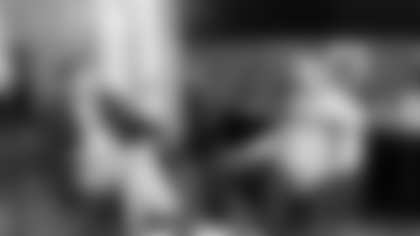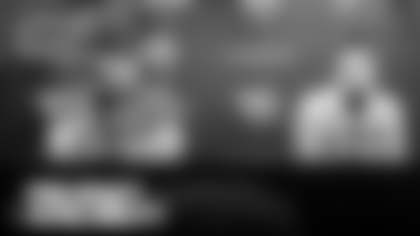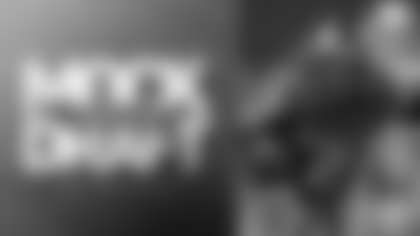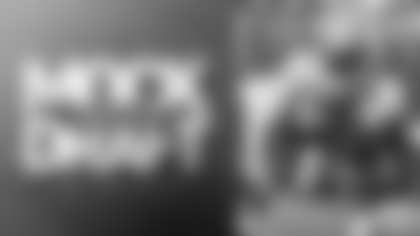Join jaguars.com Senior Editor Vic Ketchman as he tackles the fans' tough questions.
Matt from Jacksonville:
Since you mentioned it, what are the Jaguars uniform choices this year?
Vic: The home team has the choice and for all of the Jaguars' home games, including preseason games, the Jaguars will wear teal jerseys and white pants. On the road, they will wear white jerseys and black pants for all games except one, the preseason game in Philadelphia, for which the Jaguars will wear teal jerseys and white pants because the Eagles have elected to wear white jerseys.
Jason from St. Augustine, FL:
How deep should the depth be at QB? What is the ideal scenario?
Vic: The ideal scenario is to have a future Hall of Fame starting quarterback, a Gary Cuozzo as your backup, and a young, developmental guy as your third quarterback. Why Cuozzo? Because Cuozzo, who was Johnny Unitas' backup, got the reputation for being the second-best quarterback in the game. The few times he played, he was unstoppable, but he seldom played because Unitas was an iron man in those days. Cuozzo's mystique increased and it allowed the Colts to trade him to the expansion Saints for their number one pick. The quarterback position is of such importance and drama that a player can acquire that kind of value from just a few strong performances. Rob Johnson returned that kind of value to the Jaguars in a trade with Buffalo, on the strength of one regular-season game. In other words, you want a quarterback such as Unitas, who's the best in the game and seldom gets hurt, and a backup whose perceived value is greater than his talent because the few times you have to play him he does great. By the way, Cuozzo was traded a few more times after leaving Baltimore and at no time did he live up to the second-best billing.
Jim from Jacksonville Beach, FL:
How about a bloody nose Hall of Fame? I'd nominate Y.A. Tittle.
Vic: Tittle wasn't a nose guy. He's famous for the cracked-egg head. When I picked up the sports section and saw that picture, my eyes just about bulged out of my head. For me, the bloody-nose guys will always be Bobby Layne and Tommy McDonald. They're the last two NFL players not to have worn a facemask. Imagine a wide receiver going over the middle without wearing a facemask. McDonald did.
Vince from Indianapolis, IN:
You always make a big deal about crunch time. Show me a QB that needs to prove himself in the fourth quarter and I'll show you a QB that is missing the other three. I guess my question would be, in the games where a QB throws three TDs in the first quarter or half but then tanks it in the last two but still wins, did he come through in the clutch? I don't care when a team scores in a game as long as they outscore the other team. So if Manning throws one TD in the first and the Colts win 7-0, that is all that matters.
Vic: Spoken like a true choker. You know you can't get it done at crunch time, so you move crunch time to another point in the game. Not in this column you don't. I know what crunch time is and so do you. If you need an example, put on tape of the last two Super Bowls.
Ron from Bryant, AR:
Regarding the injury designations, who makes the call and what keeps teams from manipulating the system?
Vic: The head coach makes the call and the commissioner makes sure the league's head coaches don't manipulate the system. Those that attempt to do that are punished by fine and possible loss of draft pick.
Dan from London, Ontario:
What I'm thinking is they have rules to signing rookies similar to that of franchised players. They have up until a certain date to sign, after which time they receive a standardized one-year deal if one has not been found prior. So they can make the deadline for rookie draft picks to be signed the day before training camp. If a contract is not agreed upon before then, the player will get a standardized one-year deal. That way, teams can see the player's progression through that first year to see their value.
Vic: You're suggesting that a player's rookie year be used as a try-out. In other words, if you can't sign the guy, hit him with the franchise tag, which would require the team to pay the rookie the average of the five highest-paid players at his position. Here's the problem: To get the players union to agree to that system, the league would probably have to agree that a franchised rookie would become an unrestricted free agent when his rookie season was over. Now the team that franchised the rookie runs the risk of losing him and the first-round investment they made in him. Plus, I think that's a system that could be manipulated by the agents for their rookie players. If you don't like the team that drafted you, then force them to franchise you and you'll be free to sign with any team you please after your rookie season. Sorry, I don't like your idea.
Roger from Jacksonville:
Why hasn't Jim Marshall made the Hall of Fame, yet?
Vic: Because two other members of the "Purple People Eaters," Carl Eller and Alan Page, are in the Hall of Fame. The "Purple People Eaters" were good, but not good enough to have three of their members in the Hall of Fame.
Jacob from Cocoa, FL:
What are some good tips for tackling? I understand the basics of tackling and what not, but are there any special tips that you would have to offer?
Vic: Keep your head up and your butt down.
Christopher from Deland, FL:
Would you say players are more approachable today, with the technology of Twitter and Facebook? As a fan, it makes me feel like I actually know the players I'm watching and that's pretty cool.
Vic: Pro football players have always been approachable. That's what I fell in love with when I first started doing this. The idea that I could sit in Joe Greene's dorm room at training camp and talk football with him was an inspiration to me. Football players are good guys. They like to talk about football and that hasn't changed through the years. I had that relationship here with Tony Boselli, Mark Brunell and Fred Taylor, and I expect it to continue with Maurice Jones-Drew, who is an engaging interview. Baseball? It was painful going into the clubhouse after a game, but it has never been that way in football. I could go on and on about the players I've interviewed through the years. Leon Searcy was a favorite of mine. Keenan and Jimmy were great. Say what you want about Byron Leftwich, but they don't make 'em any better for the media. David Garrard has been super. I could go on and on. This year's team has lots of good guys on it and, yeah, the Twitter/Facebook craze is fueling their desire to have relationships with the media. I think it's a good thing.
Stanko from Jacksonville:
I recently got into an argument with a couple of my friends over the importance of the tight end. I argued that it's helpful but it's not a premium position at all and is sort of a luxury. Can you break down the role of a tight end on offense and his degree of importance?
Vic: Here are the two extremes of the tight end debate: 1.) Wide receivers run faster, jump higher, catch better and do more with the ball after they catch it than the tight end, which is the reason he should block a lot and catch a little. 2.) Because the tight end can block and catch, he offers the potential to do a lot by formation, creating mismatches and deception that allows the offensive coordinator to pencil-whip his counterpart. My view? I like tight ends who can block and catch. In my opinion, if he can't block, he's not a tight end. Most personnel people would tell you tight end is not a premium position, but a premium player at a non-premium position certainly increases the value of that position.
John from Jacksonville:
You said there's no loss to the Jaguars in TV revenue during a blackout. Could you elaborate? I thought the opposite was true. You're saying the Jaguars make no money from local TV coverage?
Vic: You got the last part right. Now I'll elaborate. When the league negotiates a TV contract with the various networks involved in that contract, those networks agree to abide by the NFL's blackout policy. There is no monetary penalty for games being blacked out. The annual payout to each team remains the same. As far as preseason games that are not shown on network television, teams may provide their own telecasts. They are not part of the league's TV deal with the networks and those team-produced preseason telecasts can and should produce extra revenue, but in a market the size of Jacksonville, that revenue potential is minor.
Darrick from Jacksonville:
"There's no loss of revenue if the games are blacked out." Based on this answer, can we infer that the Jaguars actually lose money by televising their games?
Vic: When a game isn't sold out and the Jaguars decide to lift the blackout by buying up the unsold tickets, they absolutely lose money by televising those games. They lose the money they've spent to buy up the tickets and they lose the money they would've earned from the tickets they would've sold because the game was blacked out, but they won't sell now because people will get it for free on TV.













